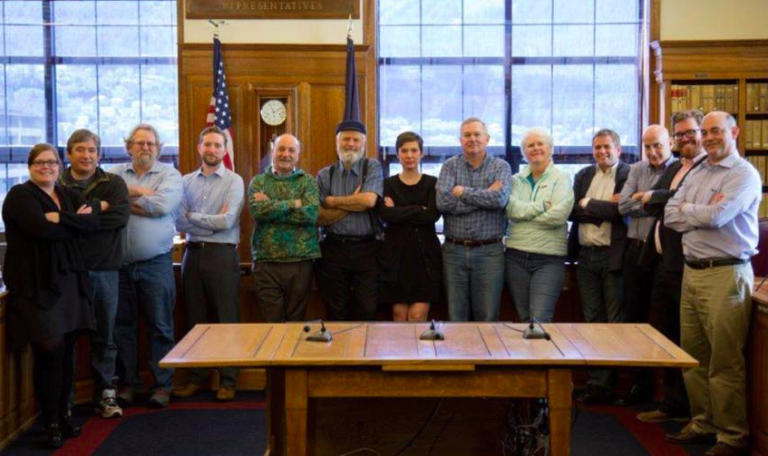
ALASKAN RUNS AFOWL OF FEDERAL AGENCY
In 2008, Henry Springer was an Alaskan of epic proportions in the scientific and engineering worlds. The University of Alaska Board of Regents and the University of Alaska Museum of the North honored the longtime Alaskan — not as the engineer, former legislator, or construction industry leader, or even as a Board of Game member.
They hailed his work as an accomplished ornithologist.
They loved him so much, in fact, that they named the University of Alaska Fairbanks museum’s ornithology lab after him: The Henry Springer Ornithology Lab, as it’s known today.
Less than 10 years later, Springer is no longer lionized. He has accepted a plea on multiple charges of alleged smuggling.
Smuggling dead birds, of all things. Felonies.
The list of offenses involves 48 bird specimens that he possessed in violation of the Migratory Birds Treaty Act. Springer has over 6,000 specimens in his collection, which has taken a lifetime to amass.
According to the search warrant, Springer had purchased the 48 birds on eBay, using the university’s federal permit. He also imported specimens from Peru, the feds said. Because of the plea deal, the public will never know which of the charges were legitimate, or if Springer was just being picked on by federal agents with too much time on their hands.
STORIED CAREER
Born in West Germany, Springer came to America first as an exchange student to Pennsylvania, and then came for good, and moved to the “wilds of Alaska” before statehood in 1959. He was just 23.
His career included being commissioner for the Alaska Department of Transportation, where his photo hangs on the wall in Juneau. He was also elected to the Alaska House of Representatives for Nome, serving one term in the late 80s. He became president of the Associated General Contractors of Alaska, representing the commercial builders of Alaska.
But those were career achievements. For his avocation, Springer was a self-taught ornithologist, who for more than four decades worked with the UAF museum’s ornithology department — giving of his time, talent, and treasure to add to its bird specimen collection. It’s become one of the top collections in the world, due in no small part to his efforts.
Springer was a hunter, taxidermist, carver, and artist — an old-school Alaskan with authentic credentials.
A decade ago, the museum’s bird curator Kevin Winker described Springer as “a classic 19th century naturalist” who was not only a talented taxidermist but an expert on international permitting for the transportation of bird specimens. He was a member of the American Ornithologists Union, the Wilson Society, the Cooper Society and the Audubon Society.
During the dedication ceremony for the museum lab’s renaming, Springer donated four more specimens: A passenger pigeon, which has been extinct for more than 100 years, a Socorro dove, now only found in zoos, a mourning dove, and an eared dove.

“It’s almost impossible for a collection like ours to add historically important research material without contributions like Henry’s,” Winker said. “The value to science and education is huge.”
Flash forward to 2014, and the U.S. Fish and Wildlife Service obtained a 41-page search warrant application to investigate whether Springer was using the museum’s permits to illegally smuggle bird specimens for his extensive private collection, which was said to have 6,000 birds. Fish and Wildlife alleged he bought 48 specimens in violation of the Migratory Bird Treaty Act.
During his arraignment last August, Springer pleaded not guilty on all 20 of the ultimate charges that the Federal government had on him. The trial was to take place in district court in Gainesville, Florida, and he’s already had to start showing up for pre-trial proceedings.
Now, three years later, Springer is 80 years old and not willing to fight a long list of charges. He is copping a plea. Yes, it’s possible that during his lifetime of collecting there might be a technical violation, but to him it is not worth spending the rest of his life fighting it.
After lots of soul searching, Springer decided it just wasn’t worth it to fight any more. He decided to take the plea bargain being offered instead of going through what would be a costly trial.
Did he cut some corners in service of the old-Alaska school of getting important things done? Things that matter to people and also to nature? Things that he has accomplished his entire life? Perhaps. We don’t know. And once the judge accepts the deal, we may never know.
The prosecution offered to drop most of the charges and limit it to three counts that he would plead guilty to: In connection to imported birds he would be guilty of conspiracy, violation of the Lacey and Migratory Bird Acts, smuggling and import violations.
When the deal is done, Henry Springer will be a convicted felon. He’ll probably avoid jail time, and he’ll have to give over the birds in question. And he’ll have a probation officer for a while.
Of course, this is all up to a judge in Florida. The next phase has plenty of peril for Springer, because an officer of the court will interview him, before making a recommendation to the Florida judge. Springer will have to appear in Gainesville for sentencing. The judge has the final say. He could, technically, go to jail.
Why would Springer accept such a harsh deal? It is a question of money. He knows if he goes to trial it will cost him as much as $100,000 to fight for his reputation. With so many charges against him, it’s pretty certain a jury would find him guilty of something — and he’d still be a felon in the end.
He also has his family to think about, and his health. He’s fought cancer during the past few years, even while fighting these accusations, and he wants to make sure his wife, who is much younger than him, is taken care of should he die first.
It all comes down to interpretation of the laws — and laws and interpretations of them change. Also, there’s the question of prosecutorial discretion unique to the jurisdiction of the regional U.S. attorney. It is a politically driven calculation, especially in the current era.
Although Springer stands firm that nothing he did was for his own personal gain, he also knows that with the complexity and variability of international and national laws, regulations, and the whims of bureaucrats, a person can make mistakes. He just wants it all behind him.
PARALLELS TO THE GIBSON GUITAR FACTORY RAID
The Springer case brings to mind the raid on Gibson Guitars by a paramilitary wing of U.S. Fish and Wildlife.
Federal agents, with automatic weapons on their hips, entered the company’s Nashville plant in 2009 to look for hardwood that the guitar maker had allegedly brought into the country.

The Department of Justice said that using rosewood from India to manufacture guitars is illegal according to India’s laws, unless it’s finished by Indian workers.
The U.S. agency was enforcing its interpretation of laws of other countries, India in this case.
The federal government executed four search warrants and seized several pallets of wood, electronic files and guitars.
Gibson maintains that the wood seized was verified as legal “FSC Controlled Wood,” from a certified supplier in accordance with Forest Stewardship Council. It was not illegally harvested or imported, the company said.
Gibson, with its reputation on the line, vowed to fight the charges. But even they succumbed, settled for $250,000, a $50,000 payoff to an environmentalist groups, and more than $2 million in legal fees. And who is to say what the untold cost to the company was for not only the shut down during the raid, but the damage to the corporate brand.
If a strong company like Gibson had to settle against the heavy boot of the feds, how could Henry Springer have stood a chance?
A LIFETIME OF ADVENTURE AND ACCOMPLISHMENT
Henry Springer, who is but one man who was on a mission to build the UAF museum’s ornithology collection, can’t fight the government at his age and in his health. Instead, he’ll settle for a felony, if it means he can work on restoring his health again.
But those who know Springer will always know him as much more than this dust-up with the federal government.
Back during the pipeline era, the State of Alaska tasked Springer with supervising the pipe hauling and distribution for all the pipe that made up the Trans Alaska Pipeline System.
Before that, he was in charge of building much of the infrastructure Alaskans still use today, including the bridges at Hurricane Gulch and the Nenana Canyon on the Parks Highway.
More of his incredible life and times were documented here by Alaska business writer Shehla Anjum. It is worth a read, as Alaskans consider whether the University Museum should peel his name off the lab door, or leave it there as a warning to others about how perilous the scientific field can be in an era of zealous federal authority.











